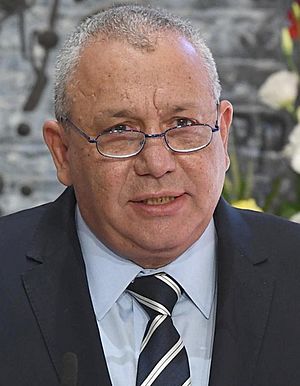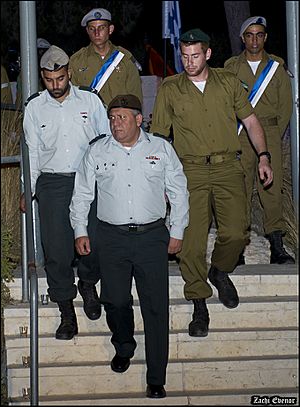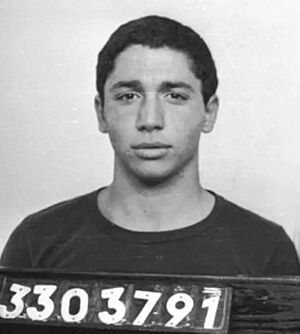Gadi Eisenkot facts for kids
Quick facts for kids
Gadi Eisenkot
|
|
|---|---|
| גדי איזנקוט | |

Eisenkot in 2020
|
|
| Ministerial roles | |
| 2023–2024 | Minister without portfolio |
| 2023–2024 | Observer of the war cabinet |
| Faction represented in the Knesset | |
| 2022–2025 | National Unity |
| Personal details | |
| Born | 19 May 1960 Tiberias, Israel |
| Education | Tel Aviv University University of Haifa |
| Awards | Commander of the Legion of Merit (United States) |
| Military service | |
| Allegiance | Israel |
| Branch/service | Operations Directorate, Northern Command |
| Years of service | 1978–2019 |
| Rank | Rav Aluf (highest rank; Lieutenant general) |
| Commands |
|
| Battles/wars |
|
Gadi Eisenkot (Hebrew: גדי איזנקוט), born on May 19, 1960, is an Israeli general and politician. He is a member of the National Unity political party.
Eisenkot was the 21st Chief of Staff of the Israel Defense Forces (IDF) from 2015 to 2019. He also served as a minister without a specific department in Israel's government from 2023 to 2024.
He grew up in Eilat and studied maritime topics. Later, he joined the IDF's Golani Brigade. Eisenkot has a degree in History from Tel Aviv University and a degree in Political Science from Haifa University. He is married and has five children. His son, Gal, passed away while serving in the Gaza war in December 2023.
Throughout his military career, Eisenkot held many important leadership roles. As Chief of Staff, he worked to make the IDF's ground forces stronger. He also created a long-term plan called "Gideon" to improve the military.
Eisenkot believes Israel should be a Jewish state but also ensure equal rights for everyone. He supports a two-state solution with the Palestinians. He also thinks it's important for Israelis to be united and strong from within.
Contents
About Gadi Eisenkot's Life
Gadi Eisenkot was born in Tiberias, a city in northern Israel. He is the second of four children. His parents, Meir and Esther Eisenkot, were Jewish immigrants from Morocco. His mother was born in Casablanca, and his father in Marrakesh.
It is believed that their family name was originally Azenkot. A clerk changed it to Eisenkot when his father moved to Israel. After his parents divorced, his father remarried and had four more children.
Eisenkot grew up in Eilat, a port city in southern Israel. He went to Goldwater High School, where he focused on maritime studies. After high school, he joined the Israel Defense Forces (IDF). He served in the Golani Brigade.
He earned a bachelor's degree in History from Tel Aviv University. Later, he completed a postgraduate degree in Political science at Haifa University.
Gadi Eisenkot is married and has five children. He lives in Herzliya. In December 2023, his son, Master Sergeant Gal Meir Eisenkot, passed away at age 25 during the Gaza war.
Gadi Eisenkot's Military Journey
Gadi Eisenkot began his military service in the Golani Brigade. He became the commander of this brigade in 1997. He started as a soldier and moved up to become a squad leader and then a platoon leader.
During the First Lebanon War, he was a company commander in the Golani Brigade. He also served as the brigade's Operations Officer. Later, he commanded the 13th Battalion of Golani.
In 1999, Eisenkot became the Military Secretary for the Prime Minister, Ehud Barak. After this, he commanded the 366th Division. He also led the Judea and Samaria Division, where he worked to stop Palestinian political violence.
In June 2005, he was promoted to head of the Israeli Operations Directorate. He helped develop a plan to strongly damage Hezbollah's main areas. This plan aimed to prevent future attacks.
In October 2006, Eisenkot became the head of the Northern Command. He focused on training soldiers and improving their ability to respond to threats. On July 11, 2011, he passed this role to Maj. Gen. Yair Golan.
He then served as Deputy Chief of General Staff starting in January 2013. In November 2014, he was chosen to be the next Chief of Staff of the IDF.
Leading the IDF: Chief of Staff

Gadi Eisenkot became the Chief of Staff on February 16, 2015. In this role, he worked to make the ground forces stronger. This included improving infantry training and armored units. He also focused on training soldiers to deal with the threat of tunnels.
Eisenkot started a multi-year plan called "Gideon." This plan was approved in April 2016. It focused on building up forces to handle different threats. It also aimed to improve the IDF's movement abilities. The plan also created a special cyber command.
A key part of "Gideon" was "The IDF Strategy." This strategy aimed to end conflicts quickly. It involved immediate and combined attacks using both movement and firepower. The strategy also included "campaigns between the wars" (CBW). This meant the IDF would work secretly to weaken enemies and prevent future conflicts.
In August 2016, Eisenkot received the Commander of the Legion of Merit award from the United States. He received it for his excellent service as Chief of Staff. The award recognized his help in strengthening cooperation between the U.S. and Israel.
Eisenkot's time as Chief of Staff ended on January 15, 2019. Aviv Kohavi took over his position.
Gadi Eisenkot's Political Path
After leaving his military role, Gadi Eisenkot considered entering politics. In 2022, he joined the National Unity political group. He was then elected to the Knesset, which is Israel's parliament.
On October 12, 2023, he became a minister without portfolio. This happened when his party joined the government during the Gaza war. Eisenkot and his party left the government in June 2024.
On June 30, 2025, his party announced that Eisenkot would leave the party. He also resigned his seat in the Knesset on July 2. Eitan Ginzburg replaced him on July 4. Eisenkot explained that National Unity needed a "deep democratization process." He felt this process had not happened.
Eisenkot has mentioned that he might run for Prime Minister. He said this could help the "anti-Netanyahu bloc" in the next election.
Gadi Eisenkot's Beliefs and Ideas
Gadi Eisenkot believes Israel should be a country with strong national-Jewish values. At the same time, he thinks it must ensure equal rights for all citizens. This includes people of any religion, nationality, race, or gender.
He sees internal disagreements within Israel as a bigger threat than outside enemies. Eisenkot supports a two-state solution with the Palestinians. He believes this will help Israel remain a Jewish and democratic state. He also wants to keep control of the Jordan Valley and certain settlement areas.
For the Gaza Strip, Eisenkot supports a long-term ceasefire. This would include the return of Israeli captives. It would also mean stopping Hamas's missile abilities. If these conditions are met, he agrees to help rebuild Gaza, including opening a seaport. He believes Israel needs a strong security policy to protect itself.
Eisenkot thinks that disagreements among Israelis are a serious problem. He encourages people to overcome political differences. He also calls for changes to strengthen the separation of powers in Israel's government. This would help create a balanced political system.
Awards and Decorations
| First Lebanon War | Second Lebanon War | Operation Protective Edge |
 | James Van Der Zee |
 | Alma Thomas |
 | Ellis Wilson |
 | Margaret Taylor-Burroughs |


